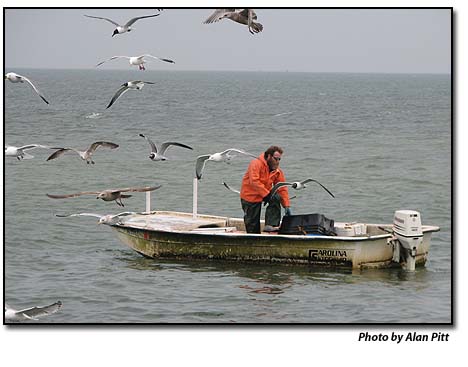A draft report posing consideration of a sweeping reduction in the citizen advisory committee system that supports the state Marine Fisheries Commission has been issued by the North Carolina Department of Environment and Natural Resources.
The draft Legislative Report on Boards, Commissions and Councils states that one 11- to 13-member advisory council would be more cost-effective than the current system of regional and standing committees. The council would meet two weeks prior to meetings of the Marine Fisheries Commission (MFC), the body that approves laws governing commercial and recreational saltwater fishing in North Carolina.
“Back in the 1980s, we had one advisory committee and it didn’t work out well,” said B.J. Copeland, vice-chairman of the MFC, in a telephone interview.
The committee structure was formally expanded to include four regional and four standing advisory committees in 1997 when the Fisheries Reform Act passed and decreased the size of the MFC from 17 to nine members.
Copeland was a member of a state committee that, after studying ways to improve fisheries management in the mid-1990s, issued a report with recommendations that became the backbone of the Fisheries Reform Act (FRA).
“One thing we heard from the public over and over again was that the issues are different from one area to another, and that was the basis for creating regional advisory committees,” Copeland said.
He said some of the standing committees might be consolidated, “but the MFC needs more than one advisory panel.”
The legislature would have to amend the FRA to change the advisory system.
Barbara Garrity-Blake, cultural anthropologist from Carteret County, worked with Copeland on the management study and later served on the MFC for several terms.
“The citizens’ advisory groups were one of the most important things to come out of the FRA,” Garrity-Blake said.
Like Copeland, she noted that fisheries issues are complex and vary from region to region.
Garrity-Blake, a candidate for state Senate representing Carteret, Pamlico and Craven counties who has called for an overhaul of the FRA, supports a strong advisory committee system.
“We could make the committees even more effective and stronger by implementing a consensus building model and moving away from majority rule,” she added.
The 2009 Appropriations Act required the Department of Environment and Natural Resources to study the elimination or consolidation of department boards and commissions with an eye towards cutting costs.
The draft report was written and approved by senior staff in the department, according to Jamie Kritzer, public information officer for the agency.
Public comments on the report are due by April 2, and can be submitted by email to Steve.Wall@ncdenr.gov or by mail to: Steve Wall, DENR, 1601 Mail Service Center, Raleigh, NC 27699-1601.
After reviewing public comments, the Department of Environment and Natural Resources will submit a final report to the General Assembly by May 1.
The draft report will be discussed at the MFC meeting in Kitty Hawk on March 24 and 25.









